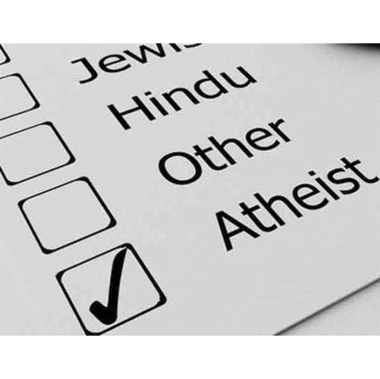Atheism: The religion of not knowing

by Dustin Woods
Visionary Columnist
Religion is a very central aspect of one’s personal identity. In the LGBT+ community, one’s relationship with religion is particularly tricky to navigate, considering that many interpretations of major religions have treated our community as wholly immoral actors. It was one such position that led me as a lifelong Christian to question my religion.
As a child, I learned how to read by my great grandmother Bertha Woods. (She was “Granny” to those who loved her.) She taught me to read the book of Matthew from the family Bible. I remember the experience vividly: I would sound out words as I sat in her lap holding an enormous Bible, learning the story of baby Jesus.
Later, I was introduced to the Royal Rangers, an ultra-Christian version of the Boy Scouts. I began attending church regularly. Eventually, the discourse about eternal damnation and possible apocalypse occurring around the upcoming millennium pushed me to question my Christianity. Those questions led to my eventual atheism for I couldn't let man’s fallibility lead me to worshiping a deity I wasn't sure existed.
I was about 13 years old when I chose my religion to be the pursuit of truth rather than the assumption of knowledge.
I came out of the closet as a gay man when I was 27. However, my first experience of “coming out” was as an atheist in high school. I don't recall how it came up or why I decided to let go of my secret but the backlash was immediate and intense.
High school drama aside, I did have a few enjoyable interactions that helped steel me to my position. The primary was the question, “What if you're wrong, shouldn't you just worship God since there are no repercussions for not being an atheist?”
The point was that my not being a Christian meant I would be going to “hell.” I considered the consequences to my conscience in this life to be too great considering I wasn't sure of an afterlife. Picking a life philosophy out of fear of an unknown afterlife seemed too morose a prospect for me. I wanted something to believe in, not something to fear.
This is not to say that all versions of Christianity are what I was exposed to. It’s just to say the forms I encountered were not appealing to me.
Atheism has no central text like a Holy Bible, Torah or Koran. Because it doesn't contain such rigid structure it allows for a wider audience to accept it given they get to define their own morality. This also requires an atheist to work harder to develop their own set of ethics. I personally have had to consider many philosophies in developing my own schema of how right and wrong are manifested in our actions.
Life, liberty and property are some basic concepts in John Locke's philosophy of the social contract. That has delivered us out of the state of nature and into civilization as elucidated by Thomas Hobbes. By building upon that foundation I have formed my own view of morality.
This process didn't start when I read Leviathan or The Second Treatise on Civil Government in college but rather through watching movies as childlike as The Land Before Time,Ferngully: The Last Rain-forest and Star Wars as a child. To me the Bible is a book of fables; though they have gone through a lengthier editing process, I still contend that a child's movie can teach morality just as well.
If preserving life is the ultimate moral imperative, which I wholeheartedly believe is a tenant of every major religion, then shouldn't we push to never take any life if we don't have to? I understand that we distinguish between human and non-human life, but my exploration of morality has led me to push for higher levels of consideration for non-human life.
The fun part of my belief structure is that I get to grow it over time, continually learning how to expand my conscientiousness in adopting principles from an unlimited list of sources.
I'm okay admitting I don't know what happens to me when I die. Anyone who claims they do know what happens is only speculating. Faith is a powerful tool and I would never question someone else's. But mine doesn't lie within a deity or a promise of everlasting peace in some afterlife.
My faith lies in the basic dignity of being human, the social contract that ensures my holy trinity (life, liberty and happiness) and the hope that humanity will finally understand our position in the world and work to be greater stewards of our environment.
Copyright 2017 The Gayly – August 21, 2017 @ 9:45 a.m. CDT.





